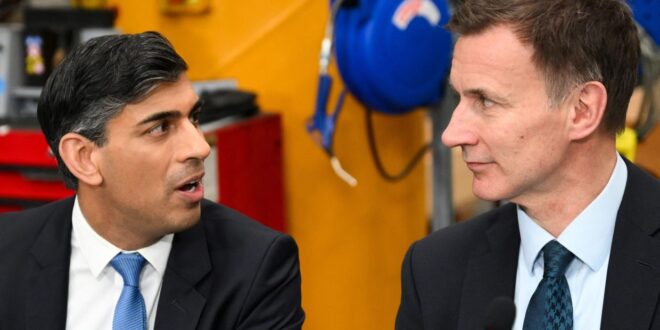London: Jeremy Hunt faces a difficult balancing act in his annual budget this week, under pressure to deliver eye-catching tax cuts to give a pre-election boost to his ailing Conservative Party, yet also hamstrung by the fragility of British public finances.
The Chancellor of the Exchequer is due to announce personal tax cuts on March 6 amounting to at least one percentage point off either the basic rate of income tax or national insurance, according to people familiar with the matter who requested anonymity because the budget hasn’t been finalised.
Hunt and Prime Minister Rishi Sunak want to go further than that, but ultimate decisions will be made after considering final economic estimates from the Office for Budget Responsibility (OBR), the people said.
Hunt’s challenge has been finding the money for voter-pleasing giveaways given a weak economic starting point: prior to any new policies, the OBR has said he has about £13bil of breathing space before he breaches his own fiscal rule to have the national debt falling in five years’ time.
That margin is near historic lows – and he will want to retain some of it. That’s why he’s been considering revenue-raising options including scrapping the non-domiciled tax status and extending a windfall tax on oil and gas company profits – to give himself more funds to play with.
“The room for manoeuvre is tiny, which is never what you want as a chancellor, and definitely not in an election year,” said Helen Thomas, an ex-adviser to former Tory finance minister George Osborne and chief executive officer of BlondeMoney, a macroeconomic consultancy. “He’s really got a problem.”
Hunt’s dilemma is magnified by the perilous position the Tories find themselves in the opinion polls. They’ve trailed the opposition Labour Party by around 20 points for months, and Sunak must hold an election by the end of January 2025.
The budget is potentially the last big set-piece opportunity for the Conservatives to change that narrative – though they could yet hold their annual conference in October and hold an Autumn Statement before a vote later in the fall or in the winter.
The Tories have suffered a string of recent heavy by-election defeats and are yet to recover from the economic chaos wrought by the premiership of Liz Truss and the scandal-hit leadership of ex-premier Boris Johnson.
The grim electoral outlook is why Conservative members of parliament are calling for crowd-pleasing tax cuts that they can sell on the doorstep – and Hunt would like to find the cash for a two percentage-point cut to income tax or national insurance in order to answer those demands, the people said.
But against those demands Hunt has to balance the risk of going too far with any fiscal loosening, which may pressure Bank of England (B0E) rate-setters to delay cutting interest rates if Hunt’s giveaways are deemed likely to fuel inflation. There’s also the latent fear of roiling the markets as Truss did with an enormous package of unfunded tax cuts.
“Jeremy Hunt has limited headroom against his fiscal target and with an election on the horizon, he will want to avoid giving investors any reason to re-assess the timing of interest rate cuts this year,” said Bloomberg Economics’ Dan Hanson and Ana Andrade.
British inflation is currently forecast to drop below the BoE’s 2% target in the spring, and governor Andrew Bailey has said the bank doesn’t need to wait for inflation to return to target before cutting interest rates from 5.25%. Speaking to lawmakers last month, he said the timing of cuts will depend on progress in tackling price growth.
“Hunt’s going to have to be careful,” said Vicky Pryce, chief economic adviser at the Centre for Economics and Business Research. “He’s relying hugely politically on the BoE bringing rates down for the feel-good factor to improve.”
Facing tight public finances Hunt has been examining tax-cutting options including a potential squeeze on future public spending.
Yet he was already criticised last November for having spending assumptions that were deemed implausibly low and vague, with OBR chair Richard Hughes saying they were worse than fiction. Reducing future spending would also open Hunt up to the charge that he’s bringing back austerity at a time when public services are struggling.
Hunt told MPs last month the budget will continue the tax-cutting moves in the Autumn Statement, when he announced a two percentage-point cut in national insurance and gave a major tax break to businesses.
He said he wants to pursue “smart” tax cuts that boost growth – a concern for the government after the country dipped into recession in the second-half of last year.
One area Hunt has been considering is the £50,000 salary threshold at which child benefit begins to be withdrawn from parents. It’s remained fixed since 2013 and means parents face an effective tax rate of up to 68% on income earned between £50,000 and £60,000.
Campaigners such as finance expert Martin Lewis say the threshold is unfair, and lifting it is on a list of measures Hunt would like to do if the OBR’s final forecasts allow, a person said. — Bloomberg
 BeritaKini.biz Berita Viral Terkini di Malaysia
BeritaKini.biz Berita Viral Terkini di Malaysia





